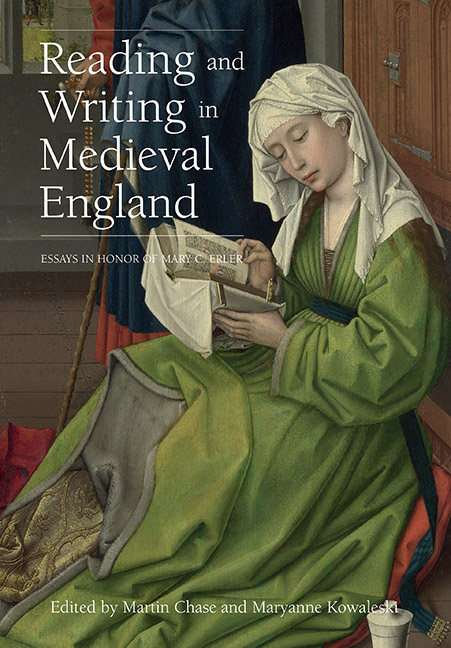Book contents
- Frontmatter
- Contents
- List of Illustrations
- List of Contributors
- List of Abbreviations
- Introduction: Bibliography in the Service of Biography
- “Withinne a Paved Parlour”: Criseyde and Domestic Reading in a City under Siege
- Beatrice Melreth: A London Gentlewoman and her Books
- How Intellectual Were Fifteenth-Century Londoners? Grammar versus Logic in the Citizens’ Encounters with Learned Men
- Social Memory, Literacy, and Piety in Fifteenth-Century Proofs of Age
- Crafting the Old Testament in the Queen Mary Psalter
- Affective Reading and Walter Hilton's Scale of Perfection at Syon
- Book Accessories, Gender, and the Staging of Reading
- Enska Vísan: Sir Orfeo in Iceland?
- Reading the Real Housewives of John Foxe's Book of Martyrs
- The Writings of Mary Carpenter Erler
- Index
- Tabula Gratulatoria
Enska Vísan: Sir Orfeo in Iceland?
Published online by Cambridge University Press: 21 June 2019
- Frontmatter
- Contents
- List of Illustrations
- List of Contributors
- List of Abbreviations
- Introduction: Bibliography in the Service of Biography
- “Withinne a Paved Parlour”: Criseyde and Domestic Reading in a City under Siege
- Beatrice Melreth: A London Gentlewoman and her Books
- How Intellectual Were Fifteenth-Century Londoners? Grammar versus Logic in the Citizens’ Encounters with Learned Men
- Social Memory, Literacy, and Piety in Fifteenth-Century Proofs of Age
- Crafting the Old Testament in the Queen Mary Psalter
- Affective Reading and Walter Hilton's Scale of Perfection at Syon
- Book Accessories, Gender, and the Staging of Reading
- Enska Vísan: Sir Orfeo in Iceland?
- Reading the Real Housewives of John Foxe's Book of Martyrs
- The Writings of Mary Carpenter Erler
- Index
- Tabula Gratulatoria
Summary
Enska Vísan, literally “The English Verse,” is a little-known and never-published Icelandic poem from the end of the Middle Ages. Because of its affinity to the Middle English Sir Orfeo, it seems a good subject for this volume in honor of Mary Erler: Sir Orfeo is one of the many texts Mary and I have enjoyed teaching together over the years at Fordham, and I hope she will take pleasure in this analogue. The text of Enska Vísan has been transmitted through scribal networks and reading communities in Iceland, not unlike those in England that Mary's work has done so much to elucidate. Because Enska Vísan defies classification in the usual subgenres of late medieval Icelandic poetry – rímur (long narrative poems), fornkvæði (ballads), and trúarkvæði (devotional poems) – and because this body of literature traditionally has been published in genre-specific collections, the poem has never appeared in print. The rímur have long been subject to scholarly study, and the fornkvæði have come into their own with the critical edition by Jón Helgason and the masterful survey by Vésteinn Ólason, but the truarkvæði have received less attention. Enska Vísan shares characteristics with Icelandic (and English) metrical romances, ballads, and devotional poems, but there are also differences enough to prevent its being placed squarely in any one traditional genre. What follows is a presentation of the text of the poem along with a discussion of its context. I have found Enska Vísan transmitted in eleven manuscripts – there may well be more – from the seventeenth through the nineteenth centuries, and it is known to have existed in two others, now lost. The dating of the poem itself is uncertain.
Enska Vísan presents a narrative that shares elements with the Middle English Sir Orfeo. The story can be summarized as follows: an unnamed knight and his beloved have promised one another to join their lives in all ways and to share fully in all things. The knight wants to go to court, while his beloved must remain behind. The knight goes on his way, and Death comes quickly on the scene to seize his beloved and escort the unwilling lady to the otherworld.
- Type
- Chapter
- Information
- Reading and Writing in Medieval EnglandEssays in Honor of Mary C. Erler, pp. 178 - 210Publisher: Boydell & BrewerPrint publication year: 2019



